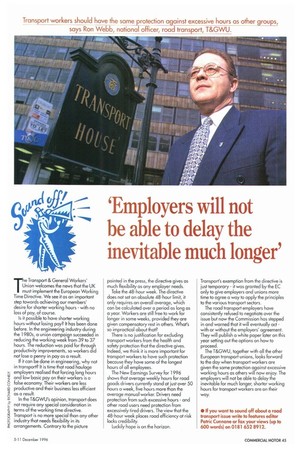'Employers will not be able to delay the inevitable much longer'
Page 47

If you've noticed an error in this article please click here to report it so we can fix it.
The Transport & General Workers' Union welcomes the news that the UK must implement the European Working Time Directive. We see it as an important step towards achieving our members' desire for shorter working hours with no loss of pay, of course.
Is it possible to have shorter working hours without losing pay? It has been done before. In the engineering industry during the 1980s, a union campaign succeeded in reducing the working week from 39 to 37 hours. The reduction was paid for through productivity improvements, so workers did not lose a penny in pay as a result. If it can be done in engineering, why not in transport? It is time that road haulage employers realised that forcing long hours and low basic pay on their workers is a false economy. Their workers are less productive and their business less efficient as a result.
In the T&GWU's opinion, transport does not require any special consideration in terms of the working time directive. Transport is no more special than any other industry that needs flexibility in its arrangements. Contrary to the picture painted in the press, the directive gives as much flexibility as any employer needs. Take the 48-hour week. The directive does not set an absolute 48-hour limit, it only requires on overall average, which can be calculated over a period as long as a year. Workers are still free to work far longer in some weeks, provided they are given compensatory rest in others. What's so impractical about that? There is no justification for excluding transport workers from the health and safety protection that the directive gives. Indeed, we think it is more important for transport workers to have such protection because they have some of the longest hours of all employees. The New Earnings Survey for 1996 shows that average weekly hours for road goods drivers currently stand at just over 50 hours a week, five hours more than the average manual worker. Drivers need protection from such excessive hours and other road users need protection from excessively tired drivers. The view that the 48-hour week places road efficiency at risk lacks credibility. Luckily hope is on the horizon. Transport's exemption from the directive is just temporary it was granted by the EC only to give employers and unions more time to agree a way to apply the principles to the various transport sectors. The rood transport employers have consistently refused to negotiate over the issue but now the Commission has stepped in and warned that it will eventually act with or without the employers` agreement. They will publish a white paper later on this year setting out the options on how to proceed. The T&GWU, together with all the other European transport unions, looks forward to the day when transport workers are given the same protection against excessive working hours as others will now enjoy. The employers will not be able to delay the inevitable for much longer, shorter working hours for transport workers are on their way.








































































































